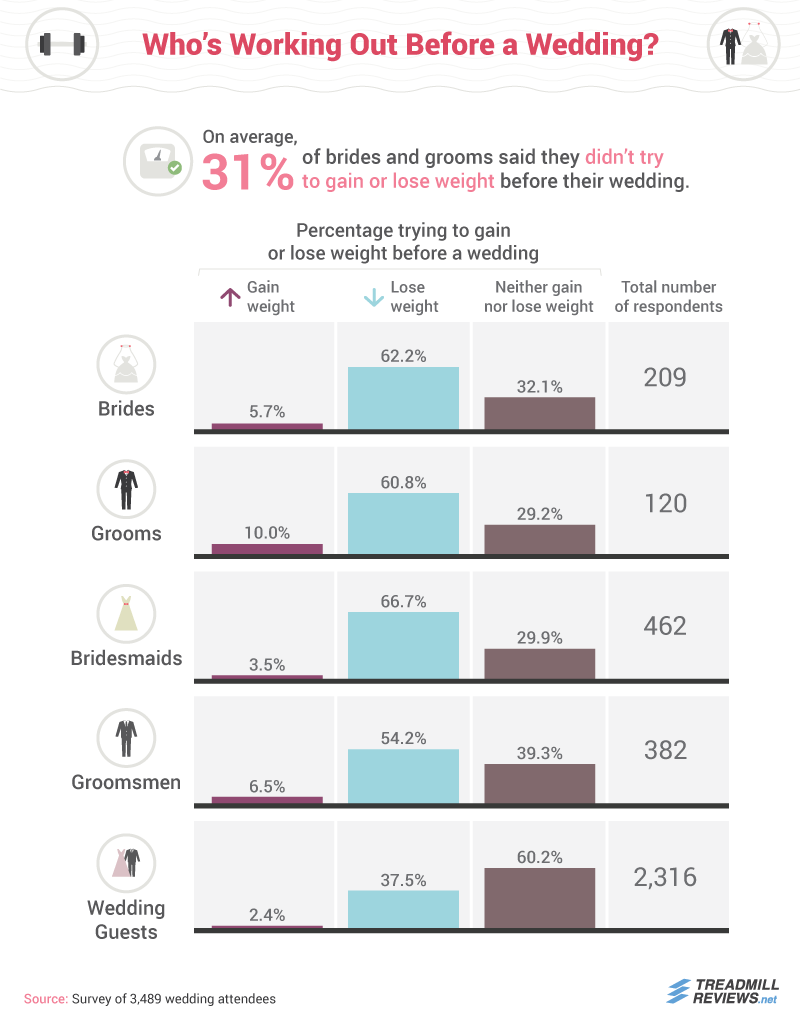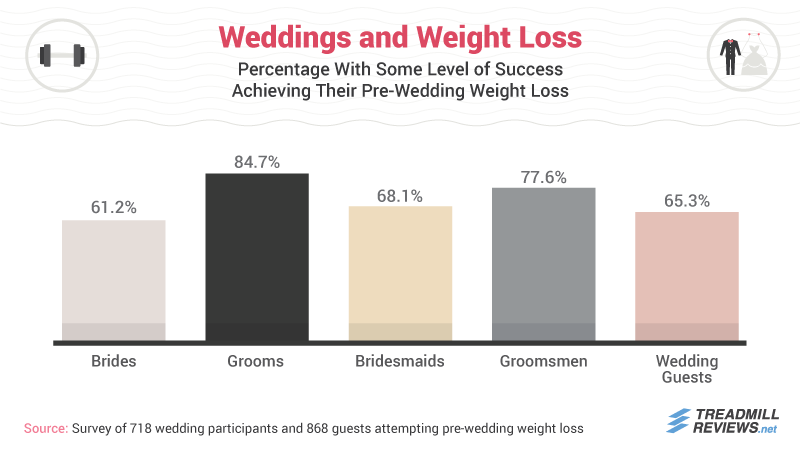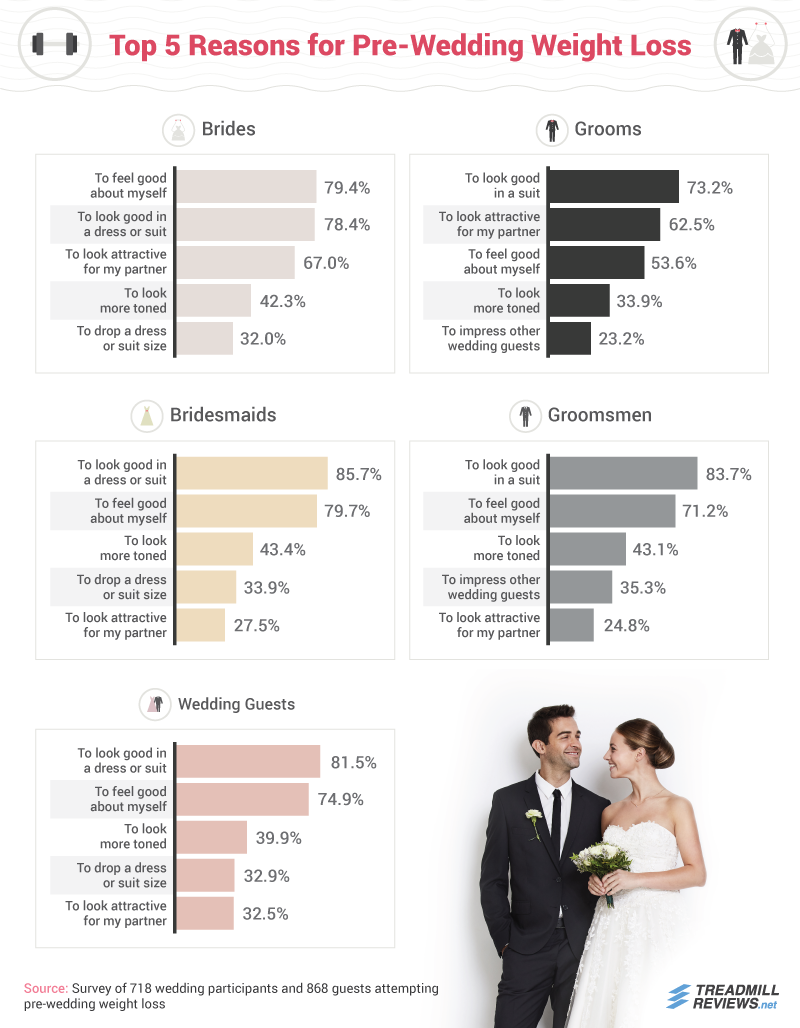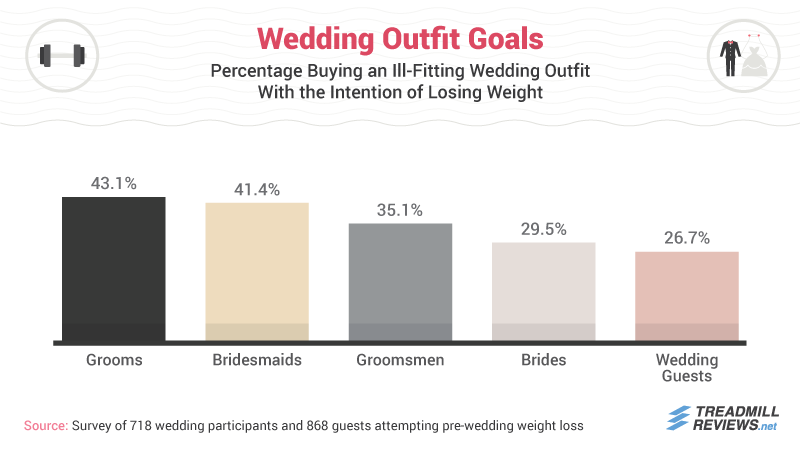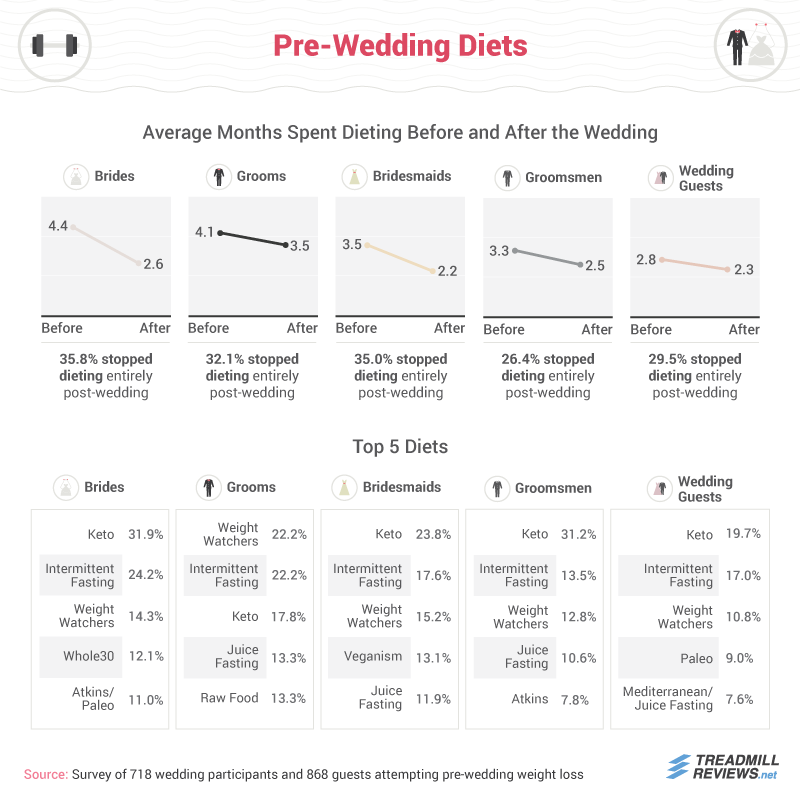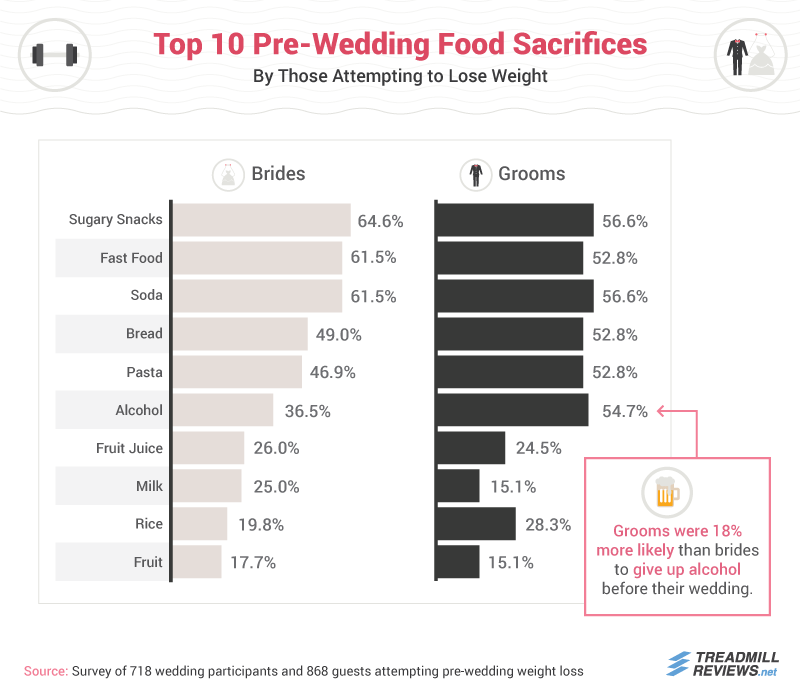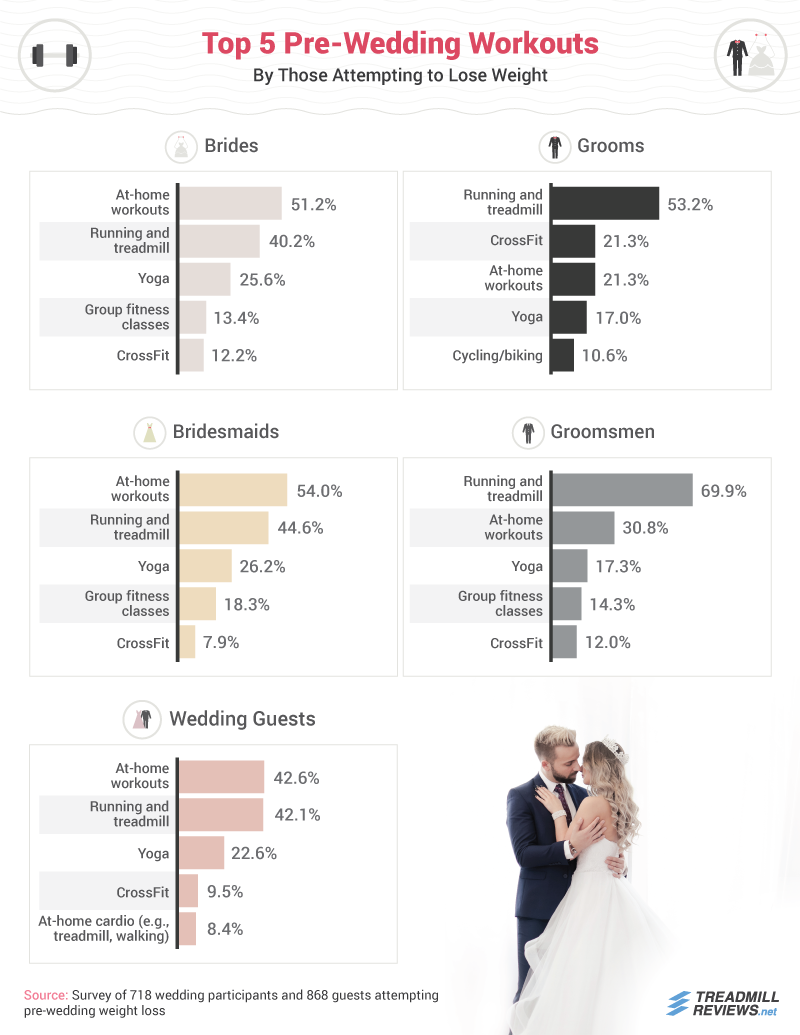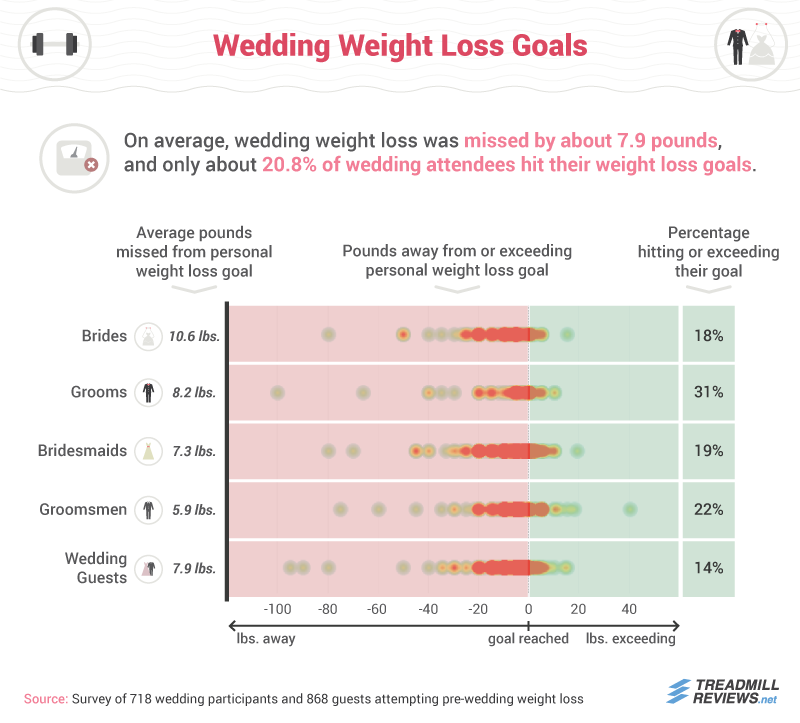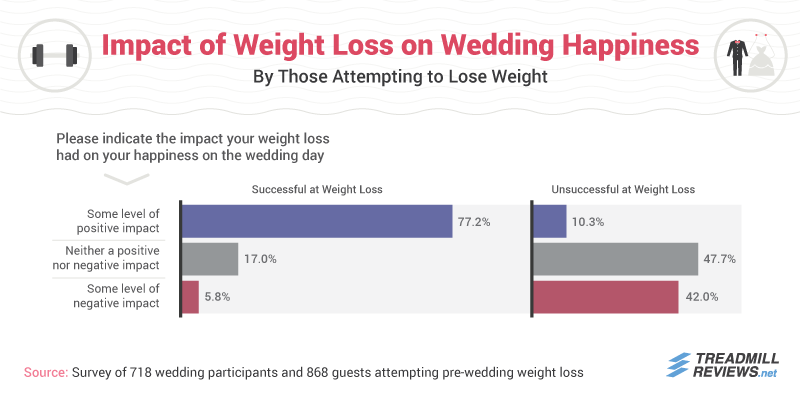Wedding preparations stress aesthetic perfection: From picking a dress to planning the table settings, matrimony entails plenty of pageantry. And in the weeks before they say, “I do,” many couples turn a critical eye toward their own bodies as well. Brides often feel pressured to try “shedding for the wedding,” adopting grueling diet and exercise routines to slim down before the big day. Grooms are sometimes prone to the same insecurities, worrying about their appearance on the altar. What do men and women usually do to lose weight before they wed, and how often do they actually succeed?
We surveyed nearly 3,500 individuals about their attempts to alter their waistline in preparation for a wedding and studied the efforts of brides, grooms, members of the bridal party, and other wedding guests. Our findings reveal the ambitious goals and mixed results of people who seek to adjust their weight before the ceremony. From common weight loss motives to diet and exercise strategies, our data show how a wedding’s emphasis on appearances can affect everyone involved. Keep reading to learn how people try to get fit before it’s time to get hitched.
Slimming for the Ceremony
Among those getting married, weight loss was the predominant goal. More than 6 in 10 brides and grooms said they tried to slim down in the run-up to their nuptials. Some experts voice concerns about this overwhelming emphasis on shedding pounds, noting that it can inject additional anxiety during a time characterized by stressful preparations. Nearly 6 percent of brides and 10 percent of grooms reported a desire to gain weight as well, perhaps in the hopes of adding muscle for their nuptials. Cumulatively, therefore, less than one-third of individuals getting married didn’t attempt to change their weight – a striking testament to weddings’ emphasis on appearances.
In fact, weight loss pressures extended to the wedding party as well. Two-thirds of bridesmaids and a majority of groomsmen said they tried to shed pounds before the big day. Weight differences within the bridal party can be the cause of immense controversy: In certain widely reported incidents, brides have booted friends from the wedding for gaining weight or attempted to “fatten up” their bridesmaids to appear slim in comparison. Even 37 percent of wedding guests felt eager to lose a few pounds before the ceremony, suggesting nuptials can inspire new fitness goals for virtually anyone involved.
Success in Shedding Pounds?
Our data suggest an unfortunate irony: While women are more likely than men to experience body image insecurities, grooms reported significant success with regard to their wedding weight loss goals. Whereas just 61 percent of brides reported weight loss success to any extent, almost 85 percent of grooms said they were at least somewhat successful in shedding pounds. This finding likely reflects what large-scale weight loss studies have consistently concluded: Men tend to lose weight more rapidly than their female peers due to differences in body composition and metabolic rates.
Interestingly, bridesmaids seemed more successful in slimming down than brides themselves: 68 percent reported at least some success in losing weight. Additionally, 65 percent of wedding guests said they accomplished their weight loss goals to some degree – also a better success rate than brides. Perhaps brides set particularly ambitious goals relative to other guests, therefore increasing their odds of falling short. But these results may also reflect the pressure of planning a wedding. Stress is known to cause weight gain, and many brides-to-be find nuptial preparations exhausting and overwhelming.
Objectives and Incentives
For bridesmaids and groomsmen alike, the top motive for wedding weight loss was the desire to look good in their chosen outfit. This desire may be especially strong given the expense of wedding party attire: Bridesmaid dresses can cost hundreds, and groomsmen often spend big on new suits or tuxedo rentals. For grooms, the desire to look svelte in their wedding outfit was the top weight loss motive as well. Almost 63 percent also said they wanted to look attractive for their partner.
Among brides, conversely, the top reason for wedding weight loss was more internally oriented. Roughly 4 in 5 brides said they sought to shed pounds to feel good about themselves. Nearly as many wanted to lose weight to look good in their chosen dress: With the average wedding gown bearing a price tag over $1,500, the garment had better fit and be flattering. In fact, 32 percent of brides sought to drop at least a full dress size by their wedding day – so how many intentionally bought an ill-fitting dress to fuel their weight loss ambitions?
Thirty percent of brides bought a small wedding dress with the intention of losing weight. Many experts recommend against this practice, noting that a dress can be taken in during alterations if the bride does indeed slim down. Interestingly, grooms and bridesmaids were far more likely than brides to buy ill-fitting outfits with the intention of losing weight. Perhaps for these groups, the prospect of having to buy an entirely new outfit later is not so financially daunting.
Selecting – and Sustaining – a Diet
For reasons both physiological and psychological, diets are hard to maintain – meaning their results can be fleeting. Yet, our findings suggest that some wedding participants begin to change their food habits many weeks in advance, and some sustain these habits long after the ceremony has ended. On average, brides began dieting 4.4 months before their wedding day, with most favoring either the keto diet or intermittent fasting. These two diets were also most popular among bridesmaids, groomsmen, and other wedding guests, with some individuals even attempting to combine them.
Grooms, meanwhile, began their diets 4.1 months ahead of the wedding on average and found unusual success in sustaining their eating habits long after the wedding. Grooms typically maintained their diets for 3.5 months after saying “I do,” meaning their diets tended to last longer than brides’ overall. This finding is particularly encouraging given recent research suggesting that men are especially prone to weight gain after getting married. Grooms were also distinct in their attraction to Weight Watchers, utilizing it at a high proportion in comparison to other groups.
Forgoing Food Favorites
If diets are relatively common, what delectable items did brides and grooms eliminate from their diets in the weeks before their wedding day? For brides, sugary snacks were the most likely to be eliminated, with nearly 65 percent of brides removing them from their diets. Similarly, sugary foods topped the list of foods grooms were most likely to eliminate from their diets, (56% of them did so), but they were equally likely to remove soda. Fast food and bread were also commonly excluded by brides and grooms alike. Many items of these kinds contain alarming amounts of sugar, and nutritionists confirm that removing them from one’s diet can lead to significant weight loss and several other health-related benefits.
Grooms proved more likely than brides to discard two starchy items: More than half cut out bread and pasta from their diets ahead of the wedding. Grooms also ditched alcohol more often, with almost 55 percent abstaining from all booze in the weeks before the ceremony. Experts say that alcoholic beverages typically contain empty carbs, a serious weight loss impediment. But eliminating alcohol may be wise for another reason as well: You’re less likely to exercise restraint with other foods when you’re tipsy.
Engagement Exercise
An interesting gender divide emerged around preferred forms of exercise for wedding weight loss. Among brides and bridesmaids, at-home workouts were the top exercise type; experts say streaming platforms are rapidly gaining popularity among those who prefer not to visit the gym. Our trusted treadmill experts provide detailed reviews, recommendations, and product knowledge on the best treadmills to use at home, including NordicTrack Commercial X22i by NordicTrack and Echelon Stride. Over a quarter of brides and bridesmaids tried yoga to lose weight as well. Although not traditionally considered an aerobic exercise, yoga can burn calories and promote mindfulness around healthy eating according to proponents.
Grooms and groomsmen, conversely, were more inclined to run outside or on the treadmill. Both are effective modes of improving cardiovascular health and encouraging weight loss, but treadmills provide the benefits of running regardless of moody weather or how jogging-friendly a city is. The options for the best running treadmills are endless. The Landice L7 is a popular treadmill for grooms and groomsmen who are serious about running to shed weight before their big day. With treadmill working stations rising in popularity, those pressed for time now have the opportunity to be productive in a comfortable, familiar environment without sacrificing exercise. But exercise caution if you choose to frame your fitness life around the treadmill–while logging miles can drive weight loss, exercise scientists warn against relying on running alone. Cross-training burns more calories and reduces the risk of injury. Among other wedding guests, at-home workouts and running were roughly equally popular, with over 4 in 10 guests trying to shed weight each of these ways. Foldable treadmills, like the ProForm Carbon T10 by ProForm, is a popular choice for guests who like exercising within their home. The SpaceSaver design makes it easy to fold and store to save space after each use.
Falling Short of Svelte
While most wedding participants who hope to slim down do lose some pounds, relatively few actually meet or exceed their goals. These results resonate with broader trends concerning attempted weight loss: Even participants involved in rigorous scientific studies of diet and exercise struggle to lose weight and keep it off. 1 in 5 respondents reached their designated weight loss goals, with those who missed their target falling 7.9 pounds short on average.
Grooms and groomsmen seemed more successful overall, with 31 percent and 20.8 percent meeting or exceeding their weight loss goals, respectively. Brides and bridesmaids were somewhat less likely to achieve their goals, and brides missed their target by the widest margin – 10.6 pounds on average. Wedding guests were the least likely to meet their goals overall, perhaps because the specter of scrutiny is less intensely motivating for those without a role in the ceremony.
Emotional Impact
For those who set out to lose weight in time for a wedding, how does their success (or lack thereof) eventually affect their experience? Generally speaking, those who attained some measure of weight loss said their slim appearance improved their mood during the celebration. 77 percent who were somewhat successful in losing weight said doing so positively affected their experience. Though 42 percent of people who were not successful in their weight loss attempts experienced some degree of negative impact, more than half were unbothered by their failure or interpreted it positively.
Healthy Choices for the Long Haul
Our data indicate many people set ambitious weight loss targets in the weeks before a wedding – and the vast majority fall short. But if few accomplish their goals completely, most do experience some degree of success, taking pride in their modest progress. As with most healthy choices, it’s best to expect incremental improvement rather than rapid transformations. But our findings suggest it is possible to adopt healthier habits and reap real rewards for doing so.
Still, attempts to lose weight for a wedding may be woefully short-sighted. Beyond slimming down for any specific event, truly healthy choices must be sustainable. If you have a wedding approaching, perhaps it’s a chance to begin a new diet and exercise habits – ones you can maintain long after the ceremony ends. Marriage is a serious and lasting commitment, and you can be equally committed to your own well-being in the years to come.
About TreadmillReviews
We’re home to a host of comprehensive treadmill reviews written to help you find the top performing treadmills to suit your style of treadmill workouts. You won’t see any treadmills for sale, just honest, unbiased assessments including star ratings, rankings, and tools to support your search.
Methodology
We gathered answers from 3,489 respondents on Amazon’s Mechanical Turk. 209 were brides, 120 grooms, 462 bridesmaids, 382 groomsmen, and 2,316 were wedding guests. Of those respondents, 130 brides, 73 grooms, 308 bridesmaids, 207 groomsmen, and 896 wedding guests self-reported having attempted weight loss before a wedding. Participants who did not attempt to lose or gain weight before a wedding were disqualified.
Fair Use Statement
Like any good wedding ceremony, this content is meant to be shared with your friends and family. So if you know someone who’d enjoy this project, please go ahead and share it (although only for noncommercial purposes, please). If you do choose to spread the word about our work, just include a link back to this page to attribute us appropriately.


